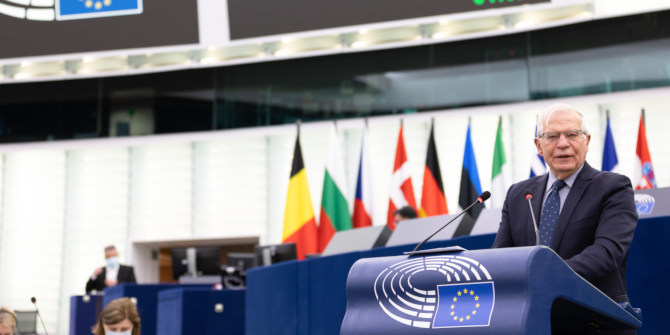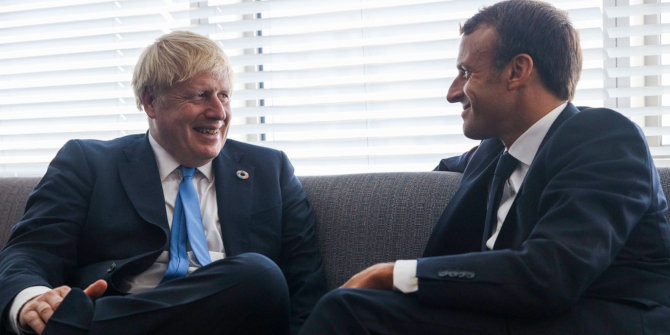 Romania’s Prime Minister, Victor Ponta, resigned on 4 November following a deadly fire in a nightclub in Bucharest. Following the resignation, a new ‘technocratic’ government led by Dacian Cioloș entered office on 17 November. Cristian Nitoiu writes that the recent developments in Romania have coincided with the political coming of age of the country’s ‘transition generation’. He argues that while the new government may not constitute a genuine break with the past, the active political role now played by the generation of Romanians born in the 1980s and 1990s has the potential to generate real political change in the coming years.
Romania’s Prime Minister, Victor Ponta, resigned on 4 November following a deadly fire in a nightclub in Bucharest. Following the resignation, a new ‘technocratic’ government led by Dacian Cioloș entered office on 17 November. Cristian Nitoiu writes that the recent developments in Romania have coincided with the political coming of age of the country’s ‘transition generation’. He argues that while the new government may not constitute a genuine break with the past, the active political role now played by the generation of Romanians born in the 1980s and 1990s has the potential to generate real political change in the coming years.
The last 25 years have highlighted that the transition of the post-Communist states from Central and Eastern Europe to democracy has been a gradual and non-linear process, with many ups and downs. Recent developments in Poland and Hungary have shown for example that changes in the government can have a negative impact on democratic standards. Moreover, accession to the EU seems to have decreased the level of progress towards strengthening democratic institutions and processes in the post-Communist states.
The transition that followed the fall of Communism in these countries has also influenced the way generations born around the end of the Cold War (80s and 90s) have chosen to engage with politics. Discontent with their countries’ leaders and the political system created by the transition has made these generations more politically conscious.
Romania is an interesting case in this respect, as the ‘political’ coming of age by the transition generation has recently started to mature. Most recently, following the resignation of Victor Ponta as Prime Minister, an apparently ‘technocratic’ government named by new Prime Minister Dacian Cioloș was put in place via a vote of confidence in the Romanian parliament on 17 November. How has Romania reached this point? The political coming of age of the Romanian transition generation has had at least three key stages.
Three acts in the transition generation’s coming of age
The first act in the process was a social coming of age. For much of the 90s and the first part of the 2000s the transition generation was largely inactive, silent and utterly inattentive to political developments. What most people of this generation were sensitive to were liberal ideas and values. These provided emancipation from conservative values which were still ubiquitous in Romanian society during this time.
Cultural or artistic forms of expression marked the development of social awareness, fostering tremendous creativity and the glue for the emergence of collective identities. Nevertheless, the social world was largely perceived by the transition generation as somewhat remote or distanced from the petty and boring squabbles of corrupt politicians.
The second act, was an economic coming of age. Romania’s EU membership, which was achieved in 2007, coupled with the gradual entry into the workforce of the transition generation, made individuals increasingly aware of the importance of economic governance on their lives. Moreover, the economic coming of age was caused by a realisation of the fact that their social world was progressing at a much greater speed than the economic conditions of the country. However, the willingness to collectively try to shape the political system in order to change the social and economic outlook of the country was still low.
The third act was a political coming of age, which has emerged only in the last five years. It was first directed against the way politicians were handling various cultural, social or environmental issues. Gradually it spread to the issue of rule of law, corruption, nepotism and the basic liberties of citizens.
Recently, the tragic fire and loss of lives in the Colectiv club provided the glue that united the transition generation in acknowledging that politics ultimately has a deep effect on their lives. As a result of this, the transition generation expressed a desire to engage in changing the political system and forcing politicians to renounce their corrupt ways of doing politics. This idea has undoubtedly spread throughout Romanian society and is supported by people from various generations.
A deeply polarised generation, but a uniform political landscape
While the desire to change the political system from the bottom up seems to be shared by the majority of the population, in terms of the actual direction of change the public sphere is very much polarised. The tragedy of the fire at the Colectiv club amassed an extremely emotional response from the transition generation. It produced in particular a revelation that widespread corruption can pose a direct threat to people’s lives and that the state should be led by professionals rather than greedy politicians.
The most vocal and organised groups of the transition generation have assumed activist roles in pursuing a diverse set of liberal ideas such as the protection of the environment, gender equality, secularism and the ‘sharing’ economy. Nevertheless, not all Romanians from the transition generation identify with this liberal agenda (and even more citizens from older generations), which has led to increased polarisation.
On the other hand, the existing political landscape embodies a series of ideas and a way of doing politics which barely resonates with most groups within Romanian society. The public perception is that politicians are not guided by ideology or contrasting views of the state, but by a reckless desire to enhance their wealth and capture state power in a sustainable manner. Former Prime Minister Ponta’s resignation was partly a result of the fact that politicians are coming to terms with the reality that Romanian society, polarised though it may be, is increasingly united by the desire to change the political system.
The new technocratic government
To a large extent the new Cioloș government is a response to the political coming of age of the transition generation and the desire to transform the political system. It promises to deliver more professionalism and usher in a change of ideas and practices in Romanian politics which are not tainted by current political parties. While it is unfair to judge the new government so early, it is clear that most of the so-called technocrats in the government have strong links with political parties or have played key roles in the establishment.

Several examples illustrate the point, such as the Defence and Foreign Affairs Ministers who have served in high level positions for many years, and the Minister for Development and Administration, who is a key figure in the former ruling party (PSD). Moreover, the new government made something of a fool of itself when it proposed at the recommendation of certain politicians a 29 year old who was still completing his medical residency for the position of Health Minister.
The proposal was withdrawn shortly after as the new Prime Minister learned of the proposed candidate’s professional status, but also allegedly due to his past work as a model. This event shows that Cioloș not only has his hands tied by the traditional parties, but also that the transition generation is still not taken seriously by politicians. In this context it is difficult to imagine that the new government will deliver on the expectations of the transition generation, and welcome genuinely new people, ideas or ways of doing politics into the fold.
Future options for the transition generation
Changing the political system and Romania’s way of doing politics is a notably broad aspiration which can easily be taken advantage of. A more effective approach would be to focus on improving or creating new ways of holding politicians and institutions accountable, increasing the transparency of political processes, or encouraging openness, responsibility and responsiveness both within society and politics.
Nevertheless, these more specific goals cannot be achieved without engaging in a broader debate about the role of the state and the individual, which has unfortunately been ignored during the transition period. The transition generation now has broadly three ways in which it can aim to proactively shape the political system.
First, it can seek to try and change the system from within by flooding traditional parties in the hope that well trained and responsible individuals would rise through the ranks. Current politicians will most likely try to prevent this from occurring at all cost. Second, it could create new parties and provide clear alternatives to the old political system. Nevertheless, traditional parties have a strong hold on Romanian society and media, which makes the emergence of new parties in the parliament almost impossible.
Finally, the transition generation could focus primarily on activism concerning specific issues in order to put continuous pressure on politicians. While this approach might be effective in the short term in relation to some policy areas, it is not sustainable nor does it lead to genuine change in the political system. Ultimately positive political transformation in democratic societies is a long and arduous process, but the political coming of age of the transition generation signals that change is on the horizon.
Please read our comments policy before commenting.
Note: This article gives the views of the author, and not the position of EUROPP – European Politics and Policy, nor of the London School of Economics.
Shortened URL for this post: http://bit.ly/1SdEHo6
_________________________________
 Cristian Nitoiu – LSE IDEAS
Cristian Nitoiu – LSE IDEAS
Cristian Nitoiu is a Dahrendorf Postdoctoral Fellow in EU-Russia relations and Ukraine at LSE IDEAS. Before this he held research positions at Trinity College Dublin and the College of Europe (Natolin campus, ENP Chair). The research for this article was supported by the Dahrendorf Forum, a joint initiative by the Hertie School of Governance, LSE and Stiftung Mercator.






There’s another problem with that first solution you mentioned, not only the current politicians but also the fact that any activist, or however else you want to call those currently participating in any way in these efforts to create a change, who’d join one of the major parties, or even any of the older minor ones, will be seen by other activists and protesters as a traitor, as having sold themselves over to the establishment for personal gain, and then this will stain everything else they had been a part of until that point, which will only be added on top of the huge amount of mistrust and paranoia that exists anyway.
On the other hand, like you said, sticking only to activism and not getting into politics is unsustainable and can’t create that necessary change. So that clearly only leaves the second solution, forming new parties, and then finding ways to get a foot in the door. It will be extremely difficult at first, of course, but a strategy that combines this political side with continued pressure in the street and through other forms of activism, and then also uses the power and visibility of “the street” to promote, as much as possible, some of these new alternatives come election time, it may just be enough to make a breach.
This way, it should be possible to get some people into various local councils, maybe even county councils, maybe even have some mayors… Then, if the pressure from the activists will be sufficient to obtain some significant changes in the electoral law, mainly the removal of the electoral thresholds for the Parliament and a significant reduction in the number of signatures needed to run, it may just be possible to squeeze a few people in there as well. They’ll have little, if any, influence in the actual decisions, of course, but this will offer them one term to gain visibility and prove how hard they can fight and how well they can sustain a link between the people and those who should be their representatives. If they do that well enough, it should be easier at the next elections, and then the ones after that.
It is, as you say, a long process, after all. But it must start, and if it won’t get to that “political” point now, it’ll mean another four lost years, and by then it may be too late, as it’s already been about that long since the start of this “awakening” and such a disappointment, or I’d say such a failure, at this point may likely be too much of a setback for “next time” to even still be an option in the minds of many.
Again, congratulations to the author. This site has as excellent a discussion of Romanian political issues as I can find. The comment above also has some important practical considerations. The period of the government of technocrats may bring some quiet improvements, but they are subject to the parliamentary veto and I do not see a realignment of the political system. It there some online site, possibly in the Romanian language, where we see these discussions being debated?